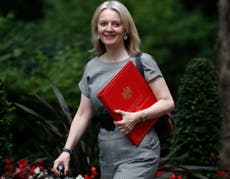Brexit: Liz Truss secures tariff wins with her Japan trade deal – for products UK doesn’t export
Exclusive: Taxes cut on birds’ eggs, raw hides, fur skins and ultra-strong spirits – but UK does not export them anyway
Your support helps us to tell the story
From reproductive rights to climate change to Big Tech, The Independent is on the ground when the story is developing. Whether it's investigating the financials of Elon Musk's pro-Trump PAC or producing our latest documentary, 'The A Word', which shines a light on the American women fighting for reproductive rights, we know how important it is to parse out the facts from the messaging.
At such a critical moment in US history, we need reporters on the ground. Your donation allows us to keep sending journalists to speak to both sides of the story.
The Independent is trusted by Americans across the entire political spectrum. And unlike many other quality news outlets, we choose not to lock Americans out of our reporting and analysis with paywalls. We believe quality journalism should be available to everyone, paid for by those who can afford it.
Your support makes all the difference.Liz Truss has been accused of misleading MPs and the public over her new Japan trade deal, because all the tariff “wins” are for goods the UK does not export to the country anyway.
Just 10 of 9,444 products will enjoy lower taxes, experts say, a list of obscure items such as birds’ eggs, raw hides, fur skins, handbags and ultra-strong spirits of at least 90 per cent alcohol.
Crucially, none of the 10 have been sold to Japan for at least three years – which means the gain to British exporters is “zero”, the study has found.
Yet Ms Truss claimed the “historic” Japan deal had achieved “strong tariff reductions on key agricultural products like pork, beef and salmon [that] will benefit farmers and food exporters”.
The reality was that “the UK has been sailing into the wind throughout the negotiations to get back to its starting point”, said Professor Alan Winters, director of the UK Trade Policy Observatory (UKTPO) at the University of Sussex.
Emily Thornberry, Labour’s shadow trade secretary, called on Ms Truss to be “straight with parliament and the British people” about the implications of the agreement for British exporters.
“Liz Truss has repeatedly claimed that her deal with Japan goes ‘far beyond’ the EU’s agreement with Tokyo, but – the more we dig into the detail on tariff rates, on projected export growth, or on protected UK brands – the more that claim falls apart,” she said.
“She has a bad habit of over-promising and under-delivering on trade deals, then trying to fill the gap with these misleading claims.”
The undermining of Ms Truss’s boasts about the deal follow the ridicule heaped on the Department for International Trade (DIT) for its false claims about the price of soy sauce.
The trade secretary also claimed that she had achieved “cutting-edge digital and data provisions” that would deliver an economic boost through the “free flow of data” with Japan.
“Today is a landmark moment for Britain. It shows what we can do as an independent trading nation,” she said last month.
However, the UKTPO concluded the benefits for services are limited to some progress towards simplifying rules and regulatory cooperation for e-commerce and the City of London.
While welcome, the changes were “very minor” in comparison with the existing deal the UK enjoyed with Japan through EU membership – which is being lost because of Brexit.
“In services and investment liberalisation, it is clear that Japan’s commitments to the EU and the UK are almost identical,” said Dr Minako Morita Jaeger, a fellow at the observatory.
She stressed the groundwork had been laid by Brussels’ greater negotiating power, because “if the UK had had to negotiate with Japan from scratch, it would not have gained the level of market access that Japan accorded to the EU”.
Ms Truss has also claimed a boost to trade with Japan worth £15.7bn over the next 15 years – but that is in comparison with no deal, not with the EU deal.
The government then acknowledged that 83 per cent of those gains would go to Japanese exporters, with only 17 per cent to the UK’s.
Furthermore, the GDP boost will be a puny 0.07 per cent – a tiny fraction of expected loss of between 5 and 8 per cent from Britain leaving the EU customs union and single market.
Professor Winters said that “to all intents and purposes in terms of tariffs, there is almost no difference between the UK-Japan and EU-Japan free trade agreements”.
“The UK government have exerted immense effort but, in terms of tariffs, have got back to more or less exactly where we started from under EU membership,” he said.
A Department for International Trade spokesperson said: “If the UK had not signed the deal with Japan, tariffs on a huge number of products would have increased on 1 January compared with World Trade Organisation terms, which would be the alternative at the end of the transition period.
“CEPA (the Comprehensive Economic Partnership Agreement) reduces tariffs on products such as beef, pork and salmon relative to trade on WTO terms.
“The UK-Japan CEPA not only provides continuity of tariff treatments and protects established supply chains, it also allows more UK goods to access preferential tariffs than the EU-Japan Agreement, thanks to new and more liberal rules of origin provisions around certain food and textile products.
“Overall, the deal is predicted to boost trade between the countries by more than £15bn, and add £1.5bn to UK GDP in years to come.”






Join our commenting forum
Join thought-provoking conversations, follow other Independent readers and see their replies
Comments